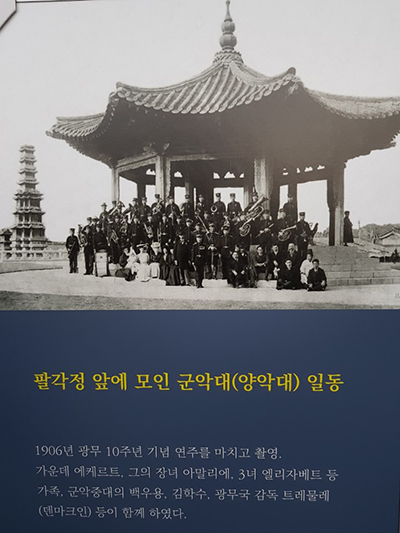A night at Pagoda Park.
It’s been 40 years since I first went to Pagoda Park.
Pagoda Park is where March 1st Movement started, and as it is next to a retirement home in downtown the elderly thend to gather there – all of this came to my mind as I headed for Pagoda Park.
It was a beautiful September evening.
Emperor Gojong invited Franz Eckert, a German composer, to teach musical instruments and made a court orchestra. On September 7th 1901, the first performance of Western music was played in Korea at Pagoda Park.
And 117 years later, on the same day and at the same place, the same music was played at last.
I was worried at first.
On the one hand, it was because I was going to be emceeing in both English and Korean for the diplomatic corps that were attending the concert. On the other hand, I was unfamiliar with the history of the time around 1901.
I crammed for the concert, but all the information went to my head, not my heart.
I didn’t expect much, and just hoped that things that were my responsibility would go right.
Yet how much I learned and was awakened that evening – from the moment I entered the park, to the moment I left!
In the park, statutes of Son Piung He and Kim Gu stood tall, and behind the stage was an old pine tree which has stood throughout the history. Behind the tree stood a tower and an octagonal pavilion.
In this very place 117 years ago, western music started to be performed at the order of Emperor Gojong 117.
Korea invited musicians from the west, made a court orchestra and composed the national anthem. We established diplomatic ties with 11 countries and played the national anthem of other countries in diplomatic events. It is impressing that we thought of “cultural diplomacy” over 100 years ago.
I heard that we were earlier to adopt electricity and train than Japan. Emperor Gojong probably dreamed of prosperity for Chosun with the adoption of western ideas and methods. He dreamed of peace in establishing diplomatic relations with foreign countries.
I have always thought Emperor Gojong was incompetent as he lost Chosun to Imperial Japan; yet I came to appreciate his anguish and concern for Chosun.
As darkness landed and beautiful lights shed light on pine trees which altogether created a historic ambience, the music that the orchestra played led me to think that way.
It was a meaningful encounter of history and music.
The national anthem of the Korean Empire was played, and people became solemn. It was our first national anthem.
After that, national anthems of the U.S.A., the U.K., Germany, France and Italy (5 of the the 11 countries from back) were played with videos of each country. Ambassadors and diplomatic corps stood up.
The hot summer weather seems a thing of the past with the refreshing weather of early autumn – moonlight permeates 1,000 audience sitting in the open space in the middle of the cosmopolitan city. Everyone seemed to be feeling patriotic.
While we were singing three of our old national anthems together, I felt a lump in my throat at the ardent patriotic lines. ‘Save the Emperor Gojong’ – as we were singing the chorus, we shed tears.
I hadn’t known that I would turn so patriotic at this event. Yet, as I emceed and talked about the history and music, I couldn’t help but feel patriotic and pray. The audience must have felt the same.
The adversity of Emperor Gojong was the adversity of our people.
Japan slowly and surely devoured our country, and the court orchestra which played western music and drew people’s attention every Thursday was eventually disbanded.
And now in 117 years, the scene has been replayed – it was so touching.
I have planned and headed about 100 concerts, yet this time with the meaningful history, I felt deeply moved.
The ‘New Korea Philharmonic orchestra’ with conductor Song Jaeyong played an encore. Yet, the deeply moved audience didn’t leave. I told them that this concert shouldn’t be a one-time thing – they should make this a permanent thing like in Emperor Gojong’s time. Our proud history engraved in the middle of Seoul was conceived, albeit late, as new history.
I’m sure the spirits of Emperor Gojong and our ancestors at that time were with us that night. And that meaningful night, we all prayed for the country and for peace.


